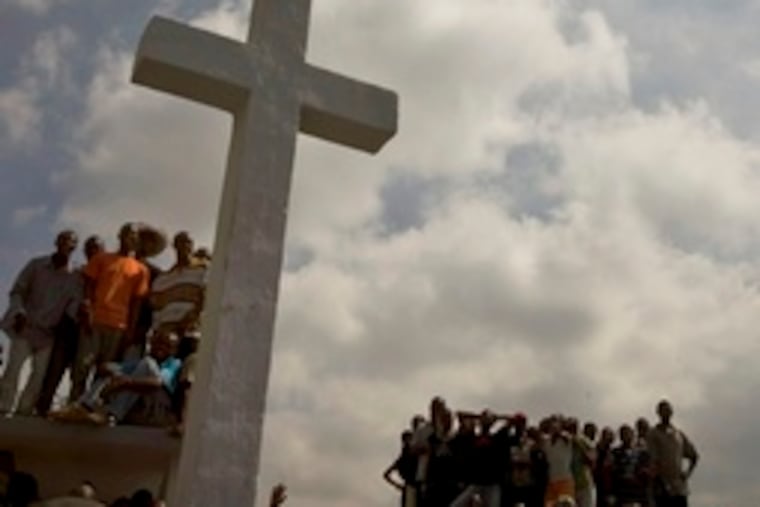Seeking help from Voodoo spirits in Haiti
Believers flock to cemeteries to pay their respects.

PORT-AU-PRINCE, Haiti - Haitians flocked to cemeteries carrying rum, candles and hopes for a better future yesterday, kicking off Voodoo's two-day festival of the dead with appeals for help with food, jobs and even the U.S. election.
Revelers clamored for a spot atop the oldest grave at Port-au-Prince's National Cemetery, which tradition holds is home to the spirit Baron Samedi, the guardian of the dead.
Many called on the spirits, or
loa
, for help in finding work, relief from soaring food prices, and recovery from four tropical storms that wiped out agriculture and killed nearly 800 people nationwide in August and September.
"This year even the Baron is hungry because everything is so expensive," said Wilmann Ambroise, 45, an electrician who said he seldom works because people have stopped building homes.
The price of a bottle of clarin - a sugar-cane moonshine that worshipers drink and offer to the spirits - had tripled to $6.25 from the year before, he said as he drank some from a foam cup.
A few even asked for intercession in U.S. politics, accusing President Bush and Sen. John McCain of meddling in Haitian politics but failing to help lift the country from poverty.
"Baron Samedi will lead Obama to be president of the United States," said Jonas Pierre, 25, who is unemployed. "He's black, just like me, so he cares about people. . . . He's going to help Haiti develop."
Voodoo, a blend of Christian tenets and African religions fused by slaves, is practiced across the nation of nearly nine million. It was sanctioned as an official religion in 2003 by the Haitian government, allowing priests to legally perform baptisms and marriages.
As people jammed together in the brutal Caribbean sun, a man portraying Papa Ghede - an aspect of the Baron - climbed the tomb and danced in front of the stout black cross that tops it, gyrating to exemplify the spirit's playful, erotic nature.
Dressed in white with a black cap, wearing crosses and epaulets, he stuck safety pins through his skin, splashed flour on his face, and took long drinks of alcohol from a purple rhinestone-covered bottle, some of which he spat into the crowd.
"Without these spirits, we wouldn't be able to keep going, so we have to pay our respects," said Maxo Jeudi, 35.
Elsewhere in the sprawling cemetery, well-dressed families paid respects to their ancestors with Catholic prayers in Latin, French and Haitian Creole. Women clad in white gathered at a church for mass. Others took naps atop graves or sang to themselves quietly beside their families' concrete tombs.